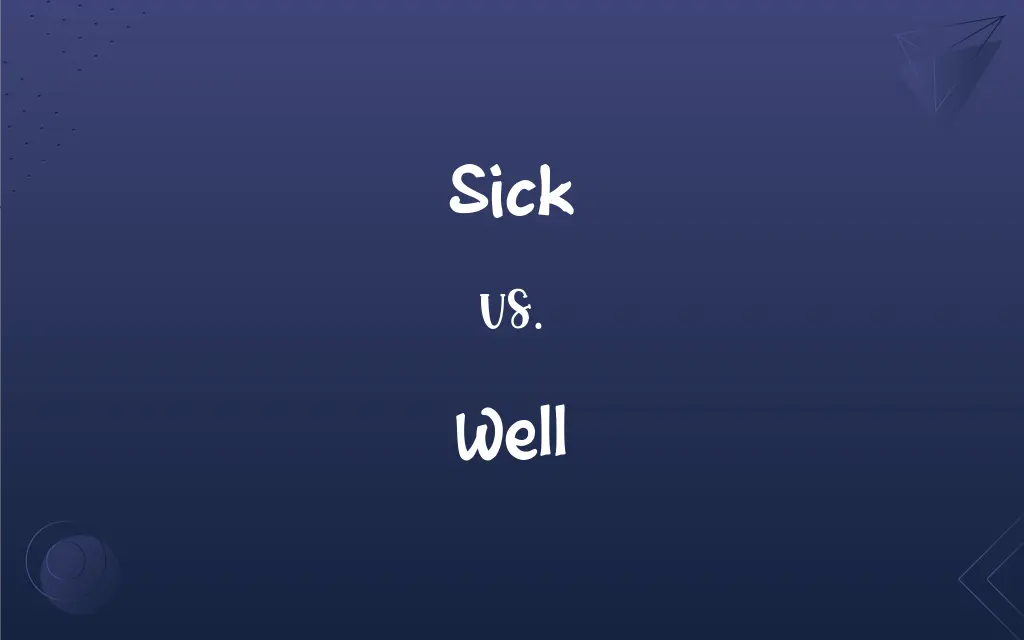Sick vs. Well: What's the Difference?
Edited by Aimie Carlson || By Harlon Moss || Published on December 29, 2023
Sick refers to affected by illness or poor health. Well refers to in good health or condition.

Key Differences
The term 'sick' implies a state of ill health or suffering from an ailment, whereas 'well' signifies a condition of good health or being free from illness. 'Sick' often indicates the presence of symptoms or disease, while 'well' suggests a lack of such symptoms and a state of physical and mental vitality.
In a broader sense, 'sick' can denote a feeling of nausea or a sense of unwellness, extending beyond physical illnesses to include psychological distress. Conversely, 'well' encompasses not just the absence of sickness but also a holistic sense of well-being, encompassing physical, mental, and emotional health.
The application of 'sick' can also extend to non-physical contexts, like expressing displeasure or dissatisfaction ("That's sickening"). 'Well,' on the other hand, often relates to satisfactory conditions or outcomes, not limited to health, like doing well in a task or feeling well emotionally.
'Sick' is sometimes used colloquially to express admiration or approval in informal contexts, a complete departure from its traditional meaning. 'Well' is more consistent in its usage, often prefacing adjectives to intensify them, as in 'well-known' or 'well-prepared.'
Comparison Chart
Afflicted with illness
Free from illness
Health Status
ADVERTISEMENT
Can imply nausea
Implies robust health
Symptomatology
Used negatively
Often used positively
Connotation
Extends to mental discomfort
Includes mental wellness
Psychological Aspect
Colloquially positive in some contexts
Consistently positive or neutral
Informal Usage
Sick and Well Definitions
Sick
Feeling nausea.
The turbulent flight made him sick.
ADVERTISEMENT
Well
In good health.
She recovered and is now well.
Sick
Eager for something, impatient.
She was sick for news from her family.
Well
Fully, thoroughly.
The instructions were well understood.
Sick
Afflicted with illness.
She felt sick and decided to see a doctor.
Well
Skillfully or competently done.
He plays the piano well.
Sick
Disgusted or repelled.
He was sick at the thought of injustice.
Well
Used for emphasis.
She is well aware of the risks.
Sick
Suffering from psychological distress.
He felt sick with anxiety.
Well
Used to express surprise or agreement.
Well, that's an interesting idea!
Sick
Suffering from or affected with a physical illness; ailing.
Well
A deep hole or shaft sunk into the earth to obtain water, oil, gas, or brine.
FAQs
What does it mean to be sick?
To be affected by illness or poor health.
Can 'sick' refer to mental health?
Yes, it can indicate psychological distress.
Can animals be described as sick?
Yes, animals can also be sick, meaning ill or unwell.
How is 'sick' used informally?
Informally, it can mean 'cool' or 'impressive.'
What does being well imply?
It implies being in good health or condition.
Is 'sick' always negative?
Generally, but colloquially it can have a positive connotation.
Can 'well' express surprise?
Yes, as in "Well, I didn't expect that!"
Is 'well' used in greetings?
Yes, like in "Hope you are well."
Is 'well' used in wishes?
Yes, like "wish you well."
Is 'well' used in expressions of relief?
Yes, like "well, that's over."
Can 'well' mean 'very'?
Yes, like "well prepared" means very prepared.
Does 'sick' have a positive slang meaning?
Yes, especially among younger people.
Does 'well' only refer to health?
No, it can refer to overall well-being or competence in a task.
Can 'well' modify other words?
Yes, it's often used as an intensifier, like 'well-known.'
Can 'well' indicate depth?
Yes, in contexts like "well into the book."
Is 'well' used in formal language?
Yes, it's appropriate in formal and informal contexts.
Are there idioms with 'sick'?
Yes, like "sick and tired" meaning fed up.
Can 'sick' describe extreme skill?
In slang, yes, like "a sick guitar solo."
Do 'sick' and 'well' have opposite meanings?
In terms of health, yes.
Can 'sick' mean tired or exhausted?
Yes, in phrases like "sick of it."
About Author
Written by
Harlon MossHarlon is a seasoned quality moderator and accomplished content writer for Difference Wiki. An alumnus of the prestigious University of California, he earned his degree in Computer Science. Leveraging his academic background, Harlon brings a meticulous and informed perspective to his work, ensuring content accuracy and excellence.
Edited by
Aimie CarlsonAimie Carlson, holding a master's degree in English literature, is a fervent English language enthusiast. She lends her writing talents to Difference Wiki, a prominent website that specializes in comparisons, offering readers insightful analyses that both captivate and inform.






































































